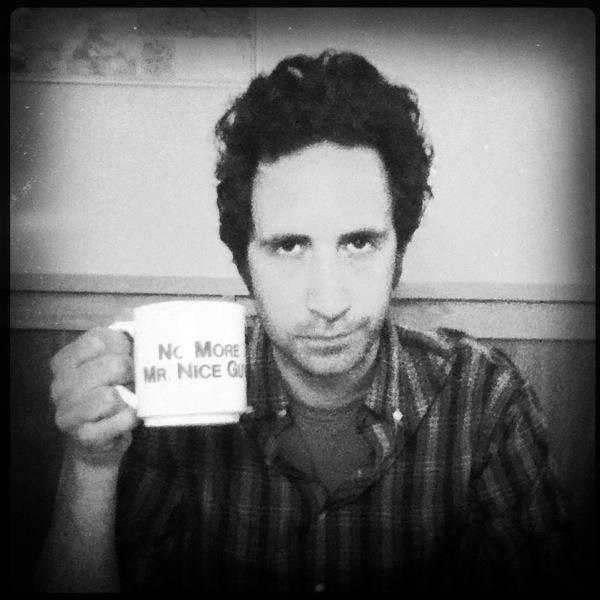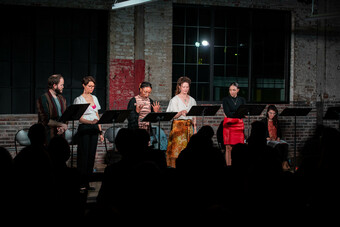When An Audience Member Wants to Give You "Feedback"
This post is part of a series explores what it's like for an artist to have an entrepreneurial mindset, and all of the different challenges that can come with it.
I love my audience. They make the whole weird process of putting together these sometimes tangential, sometimes tender, and always smirk-filled solo shows worthwhile. I get such amazing insights from them post-show, including emails that get me all teary; but occasionally there’s someone who wants to give me feedback.
There have been a couple times when I was running a fever or completely exhausted from driving ten hours to get to the gig. With no downtime and in a haze, I just stood there, mouth agape in exhaustion, listening to those audience members go on about all the things I could do to make my show “even better.”
Although always approached with the best intention, many audience members didn’t take a class in how to give constructive criticism. Add to that the complete lack of self-awareness, a tendency towards jaw jacking, and an almost manic need to engage, and you have a disaster in action. For example, the woman who talked to me the entire time I was performing. Afterwards a friend in the crowd told me everyone around her moved to the other side of the theatre to avoid being completely distracted.
Most of the time I really enjoy interacting with people post-show but I’ve also been in the position where I have to create a boundary with what I can and can’t tolerate. Sometimes I’m able to do it in a way that is quick and somewhat friendly:
“Seth, I really enjoyed your show. Have you ever thought about integrating—”
“Thanks for coming. The show keeps changing so I will probably be doing all sorts of new things in the future.”
I cut them off but try to let them know that what they are about to suggest is something I’m already thinking on. That their insight is worthwhile and most likely potent but that I don’t need to hear it.
Did I feel bad about how the interaction went? No, I didn’t. It’s important to me that I do get feedback on my work, but I want to choose the sources of that feedback through a network of trusted peers whose honesty I value above all else.
However sometimes there’s someone who wants to express themselves so badly that I have to be honest in a not-so-gentle way. When I was at a festival a few years back there was another performer who didn’t really have the whole social graces thing down. Sweet, but clueless. During an after-party event she came up to me. I was in a group of other performers who were joking around and then this happened:
“I really liked your show.”
“Thanks Sandy.” (Her name’s not really Sandy.)
“Can I tell you something that I think would help it be better?”
See, she asked for permission, which is great.
“No.”
She was totally taken aback by my reaction. At that point two of the five people in my circle slowly creeped away.
“Well, it’s not a big deal. It’s an easy fix.”
“No, I appreciate it but I’d rather not hear it.”
“Why not?”
“It’s not something I want to discuss after I’ve performed. You know what I mean?”
“But I loved it.”
“Thanks.”
“There’s just something—”
“Look Sandy, I really don’t want to know.”
The three people left in the group somehow transported out of there like we were in a Star Trek episode. I still haven’t found out how they did that.
“Well, I feel like you don’t respect me as an artist if you don’t want to hear my feedback.”
“It has nothing to do with that. I don’t know you well enough to want that feedback. See those three people over there?”
I pointed to a few people at the bar and she nodded.
“I went to school with them. I’ve known them for over fifteen years and worked intimately with them. Those are the people I’m going to ask for criticism.”
“But this isn’t a big deal.”
“Actually it is. I’ve said no to you about four or five time now and you keep pushing it.”
“Well, if you change your mind...”
“I won’t. Thanks.”
She then walked away looking pained, like I had really hurt her feelings. I did. I hurt her feelings, but she wouldn’t let up and didn’t respect the boundary that I set four times. Did I feel bad about how the interaction went? No, I didn’t. It’s important to me that I do get feedback on my work, but I want to choose the sources of that feedback through a network of trusted peers whose honesty I value above all else.
I’m lucky I’m a solo theatre artist and not a comedian. People often assume I am, but I always tell them it’s too much pressure to be funny all the time. What’s worse is that there is an unwritten law that it’s OK to heckle the person on stage while they’re in the middle of doing stand-up. Hannibal Buress recently took a drunk heckler to task, and it is a perfect example of how shutting someone down can be done with grace and punch.
It really all comes down to respect. Sometimes respect doesn’t look polite—far from it.
It’s important to remember that you have the prerogative to turn down criticism if you don’t want it. We’ve gotten to a point in our culture where forums and message boards, in combination with social media, give people the impression that they can go off on whatever it is that’s irritating them.
You don’t need to stand with that uncomfortable smile (you know what I’m talking about) while cringing inside at the interaction. You can put a stop to it. Yeah, the person bought a ticket, they’re supporting your work, and it’s incredibly important to to be gracious, but there’s nothing wrong with saying, “Thanks. I’m good though.”













Comments
The article is just the start of the conversation—we want to know what you think about this subject, too! HowlRound is a space for knowledge-sharing, and we welcome spirited, thoughtful, and on-topic dialogue. Find our full comments policy here
Yes, we all dislike hearing "feedback" or critiques we don't solicit or that we disagree with. You, apparently, dislike it so much that you felt the need to write a whole article in defense of your resistance to it. And yes, you gained some allies and bolstered your sense of righteous indignation. But what was the point? Did you write this in the hope that it would result in better art? More self-possession? If you don't like what someone says, then don't apply it to your work. You're just trying to defend yourself for being a dick. Here's an exercise: re-write your article with empathy and confidence, instead of narcissism and defensiveness.
I think you're misreading my intention completely. Thanks for your comment, though. Everyone is going to respond to this in their own way.
You're probably right... I'm probably misreading. Sorry. I don't actual think you're a dick.
I'm definitely putting my opinion out there and this is one situation. One thing I keep mentioning in various comment threads is that this sort of interaction happens maybe 10% of the time. The other 90%, there can be really interesting dialogues. It's just one situation but one I'm finding a lot of people in the field have had to contend with. This is but one way to handle it, not the only way.
Take care.
Seth, thanks so much for your personal and thoughtful essay on unwanted feedback. Years ago I was working on a play of mine at the Sundance Playwrights Lab and I remember one of the credos about feedback was that "it's not WHAT you say but WHEN you say it..." -- in other words, doesn't matter how brilliant someone's response may be (or how helpful they intend), if I'm not in a place to hear it it doesn't matter. I know the whole feedback thing is highly personal and can even vary for an artist from project to project. A couple of things that have worked for me: if I'm early in the process and don't have a great sense of my specific vulnerabilities, I don't attend the feedback. A director and dramaturg can field the feedback and later can characterize the conversation for me in terms of what might be useful given what I'm already working on. Another thing: when I've been bombarded by someone (even someone with good intentions) who wants to tell me how to rewrite or "fix" my play -- I just say, "Thank you. But figuring this out and rewriting my play is part of the great pleasure in what I do. I know you don't want to deny me that pleasure..." Keep the faith. And best to your continued work.
Thanks for your keen insights and personal dealings with this, James. All good things to note in terms of how others can field the feedback in your place so that you can focus on the work and get what seems most pertinent WHEN you need it.
" I know you don't want to deny me that pleasure..." <<< Love that.
Translation: "you're a stranger, so STFU and go bitch about what you saw on the internet like all the other strangers have the sense to do. Everyone's a critic on the internet. Go be one there."
Well said, sir.
I'm concerned that our 2-D life on the internet is transferring over to real life and causing some of this disruption. Unfortunately this has been happening pre-web so perhaps this "say anything I want" way of being in the world is getting worse than before.
Some strangers have some real insightful things to say and do it in a manner that can be embraced. Then there's the Sandys.
I concur. There's an overlap between real life and the internet where that sense of overblown entitlement at being able to post whatever you want holds sway. It's a challenge to find ways to gently remind people that their behavior online often isn't appropriate in real time face-to-face encounters.
I admire the way you consistently held the line and kept the checks and balances firmly in place. We often give up too much of ourselves; part of a performer's mystique is holding some of himself back. Not every part of you belongs to every person, nor are they entitled to take what they mistakenly believe is theirs.
Establishing and maintaining boundaries is essential to not only a performer's well-being, but to the audience's appreciation of his gifts. Kudos to you for having the courage to practice this redoubtable art.
"Not every part of you belongs to every person..." <<< This. So this. To me this is the baseline of respectful discourse. What makes us human is the ability to understand our autonomy within the context of the overall human condition.
Theater is wonderful at demonstrating that and how we as people can both love and rub each other wrong. The most interesting part for me is exploring a way to both be open and maintain appropriate boundaries through the entire process of development and performance.
I try to NEVER give feedback to a fellow artist unless they ask for it. In which case I then ask a bunch of questions about where they are in their process, what the current goals are etc. SO I can – maybe – say something actually useful. I've come to this practice after many painful hours enduring post-show audience "talk-back" sessions during my decades as part of Traveling Jewish Theatre. No matter how much coaching, moderating, preparation (like quoting from Liz Lerman's "critical inquiry" guidelines) we'd attempt, there always seem ed to be a some folks who had to tell us everything they didn't like about our work and how we could do it better. Thanks for giving voice to what so many theatre-makers feel! You give "Just say 'No'" a whole new meaning.
Thank you. There's some discussions going on on the Official Playwrights Of Facebook group in regards to this post that you might want to jump into about talk backs. There's some back and forth on it. For me I've been part of both useful and useless talk backs. Sometimes it's been a requirement of the venue/presenter that hired me and sometimes it just kind of happened.
My favorite is when I had just done a show called Losing My Religion: Confessions of a New Age Refugee where I lampoon the entire new age movement and talk about my religious upbringing. A person in the audience asked me what my favorite deity was. I asked them "Did you actually just watch my show?" They nodded smiling. I cocked my head like a dog who didn't understand the question.
The discussion on FB: https://www.facebook.com/gr...
Can I give you some critique on this blog? No really. I will just keep writing forcing you to read my opinions.
Because this isn't about your blog. It never was. This is about me. Read what I have to say. Just read it
Whenever you want my opinion I will be here.
Thanks,
Sandy.
:)
Excellent read, Seth.
Thanks, Shaun! You and I actually met years ago in SF both auditioning for some theater or film project where we waited in a room for hours for call backs. Hope you are well!
Re last post - my name is Gloria Rosen
Thanks so much for thinking this through and sharing. I think we as solo performers are just targets for this kind of nonsense - it's easier to confront
one lone person rather than a big cast. I will surely keep your advice in
mind!!
Hi Gloria,
Oh, we aren't the only ones. There's plenty of people (directors, playwrights and large ensembles) who have to endure this crap. I do agree it's a different monster when you're solo and you don't have anyone to roll your eyes at while it's occurring.
Good luck in all you do.
You know what you should do? You should.....
I love/hate this one. Someone telling me, unsolicited, how I should do something. It usually relates to how I run my business of 13 years, and the person giving feedback has only just met me and definitely never made a purchase (and never will)....
It's always the one who just met you. If there was a true relationship, the person giving the feedback would think a little more before the blurting-from-the-mouth happens.
Seth, this came up in the workshop I took with you a few weeks ago. When you immediately spoke up about this (about people making unsolicited comments about my exercise) I was really impressed with that. I did an inner high-five (presumably with "inner you"). But you are absolutely right, the culture we live in now makes everyone feel as if their opinion is not only valued, but needed ... stat.
The way I prefer to see someone make a "comment" is for them to go create something themselves -- really create something, something where they have to have some skin in the game. Let their own vulnerable creative work be their "comment."
Otherwise, they're just safely pouring hot oil from high up on the ramparts. There's no risk for them.
Anyway, good essay. Thanks for writing.
~Kemson
Yeah, I had written this a couple months back before this got posted and so when that happened in the workshop I was already in that frame of mind. I think that people are trying to come from a good place, but like you are saying, they need to demonstrate some skin in the game as well.
It's not so risky to give unsolicited feedback but it is if you are demanding that your "comment" is through your own creative process. Nice. Thanks for your insight.
Hi. Just.....thank you.
I'm a highly sensitive person..so while that makes me sensitive to inappropriate comments it also makes me sensitive to other people's feelings. I'm chronically polite. I'm a constant wearer of the "uncomfortable smile" . I'm trapped in a wanting to respect myself but still wanting to respect others vortex. It's a very painful and isolating thing. I found this quote very helpful "Respect doesn't always look polite" I'm going to try to remember that. Thank you again.
You are very welcome. There's no right way to do this. Humans are weirdos. I just wanted to present an option that we tend not to think of or execute. Be well.
You know what would have made that essay even better?
Nice ;)
Well stated! Thanks for the essay.
Your welcome. Thanks for reading!
Good for you for speaking up about this. I could not agree more.
Thank you!